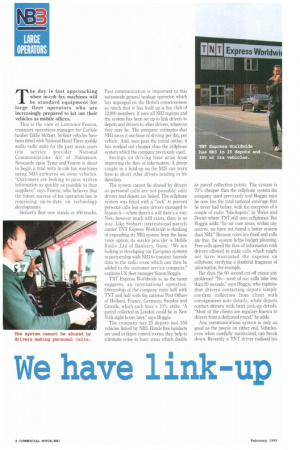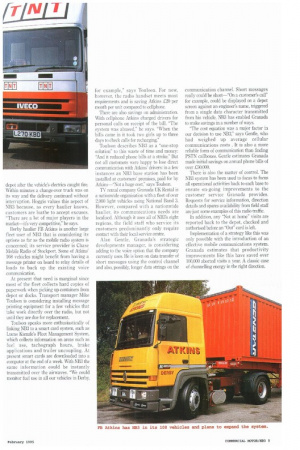We have link up
Page 106

Page 107

If you've noticed an error in this article please click here to report it so we can fix it.
The day is fast approaching when in-cab fax machines will be standard equipment for large fleet operators who are increasingly prepared to kit out their vehicles as mobile offices.
This is the view of Lawrence Fearon, transport operations manager for Carlisle haulier Eddie Stobart. Stobart vehicles have been fitted with National Rand Three mobile audio radio units for the past seven years (via service provider National Communications Air of Shiremoor, Newcastle upon Tyne) and Feat-on is about to begin a trial with in-cab fax machines using 1\183 airwaves on some vehicles. "Customers are looking to pass written information as quickly as possible to their suppliers," says Fearon, who believes that the future success of his operation lies in remaining up-to-date on technology developments.
Stobart's fleet now stands at 460 trucks. Fast communication is important to this nationwide general haulage operation which has impinged on the British consciousness so much that it has built up a fan club of 12,000 members. It uses all NB3 regions and the system has been set up to link drivers to depots and drivers to other drivers, wherever they may be. The company estimates that NB3 saves it one hour of driving per day, per vehicle. And, once past the initial outlay, it has worked out cheaper than the cellphone system which the company previously used.
Savings on driving time arise from improving the flow of information. A driver caught in a hold-up on the M25 can warn base to divert other drivers heading in his direction.
The system cannot be abused by drivers as personal calls are not possible: only drivers and depots are linked. The cellphone system was fitted with a "lock" to prevent personal calls but some drivers managed to bypass it—where there's a will there's a way. Now, however much will exists, there is no way. Like Stobart, international parcels carrier TNT Express Worldwide is thinking of expanding its N83 system from the basic voice option; its service provider is Mobile Radio ,Ltd of Banbury, Oxon. "We are looking at developing our European systems in partnership with N133 to transmit barcode data to the radio room which can then be added to the customer service computer," explains UK fleet manager Simon Hoggis.
TNT Express Worldwide is, as the name suggests, an international operation. Ownership of the company rests half with TNT and half with the national Post Offices of Holland, France, Germany, Sweden and Canada, which each have a 10% stake. "A parcel collected in London could be in New York eight hours later," says Hoggis.
The company has 25 depots and 350 vehicles linked by NB3. Hands-free headsets are used in depot control rooms; they help to eliminate noise in busy areas which double as parcel collection points. The system is 70% cheaper than the cellphone system the company used previously and Hoggis says he now has the total national coverage that he never had before, with the exception of a couple of radio "blackspots" in Wales and Dorset where TNT still uses cellphones. But Haggis adds: "In our core areas, within city centres, we have not found a better system than NB3." Because costs are fixed and calls are free, the system helps budget planning. Free calls speed the flow of information with drivers allowed to make calls which might not have warranted the expense on cellphone; verifying a doubtful fragment of information, for example.
But does the 60 second cut-off create any problems? "No—most of our calls take less than 20 seconds," says Hoggis, who explains that drivers contacting depots simply confirm collection from client with consignment note details, while depots contact drivers with brief pick-up details. "Most of the clients are regulars known to drivers from a dedicated round," he adds.
Any communications system is only as good as the people on either end. Vehicles, even when carefully maintained, can break down. Recently a TNT driver radioed his depot after the vehicle's electrics caught fire. Within minutes a change-over truck was on its way and the delivery continued without interruption. Hoggis values this aspect of NB3 because, as every haulier knows, customers are loathe to accept excuses. "There are a lot of major players in the market—it's very competitive," he says.
Derby haulier FB Atkins is another large fleet user of NB3 that is considering its options as far as the mobile radio system is concerned; its service provider is Chase Mobile Radio of Stockport. Some of Atkins' 108 vehicles might benefit from having a message printer on board to relay details of loads to back up the existing voice communication.
At present that need is marginal since most of the fleet collects hard copies of paperwork when picking up containers from depot or docks, Transport manager Mike Toulson is considering installing message printing equipment for a few vehicles that take work directly over the radio, but not until they are due for replacement.
Toulson speaks more enthusiastically of linking NB3 to a smart card system, such as Lucas Kienzle's Fleet Management System, which collects information on areas such as fuel use, tachograph hours, brake applications and trailer uncoupling, At present smart cards are downloaded into a computer at the end of a week. With NB3 the same information could be instantly transmitted over the airwaves. "We could monitor fuel use in all our vehicles in Derby, for example," says 'Poulson. For now, however, the radio handset meets mos( requirements and is saving Atkins £20 per month per unit compared to cellphone.
There are also savings on administration. With cellphone Atkins charged drivers for personal calls on receipt of the bill. "The system was abused," he says. "When the bills came in it took two girls up to three days to check calls for recharging."
Toulson describes NB3 as a "one-stop solution" to this waste of time and money: "And it reduced phone bills at a stroke." But not all customers were happy to lose direct communication with Atkins' drivers: in a few instances an NB3 base station has been installed at customers' premises, paid for by Atkins—"Not a huge cost," says Toulson.
TV rental company Granada UK Rental is a nationwide organisation with a fleet of over 2,000 light vehicles using National Band 3. However, compared with a nationwide haulier, its communications needs are localised. Although it uses all of N133's eight regions, the field staff who service its customers predominantly only require contact with their local service centre.
Alan Gentle, Granada's strategic developments manager, is considering adding to the voice option that the company currently uses. He is keen on data transfer of short messages using the control channel and also, possibly, longer data strings on the communication channel. Short messages really could be short—"On a customer's call" for example, could be displayed on a depot screen against an engineer's name, triggered from a single data character transmitted from his vehicle. NB3 has enabled Granada to make savings in a number of ways.
"The cost equation was a major factor in our decision to use NB3," says Gentle, who had weighed up average cellular communications costs . It is also a more reliable form of communication than finding PSTN callboxes. Gentle estimates Granada made initial savings on annual phone bills of over ,G0,000.
There is also the matter of control. The NB3 system has been used to focus to focus all operational activities back to each base to ensure on-going improvements to the customer service Granada provides. Requests for service information, direction details and spares availability from field staff are just some examples of this radio traffic.
In addition, any "Not at home" visits are reported back to the depot, checked and authorised before an "Out" card is left.
Implementation of a strategy like this was only possible with the introduction of an effective mobile communications system. Granada estimates that productivity improvements like this have saved over 100,000 aborted visits a year. A classic case of channelling energy in the right direction.














































































































